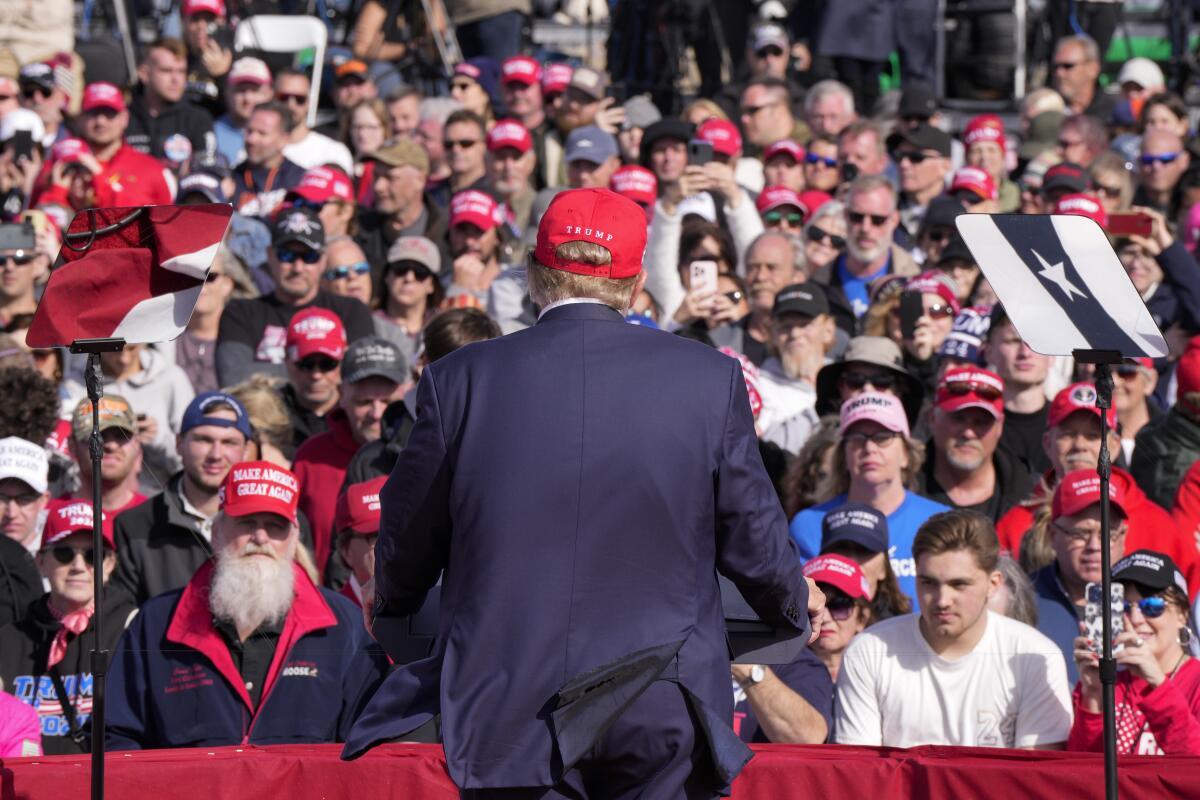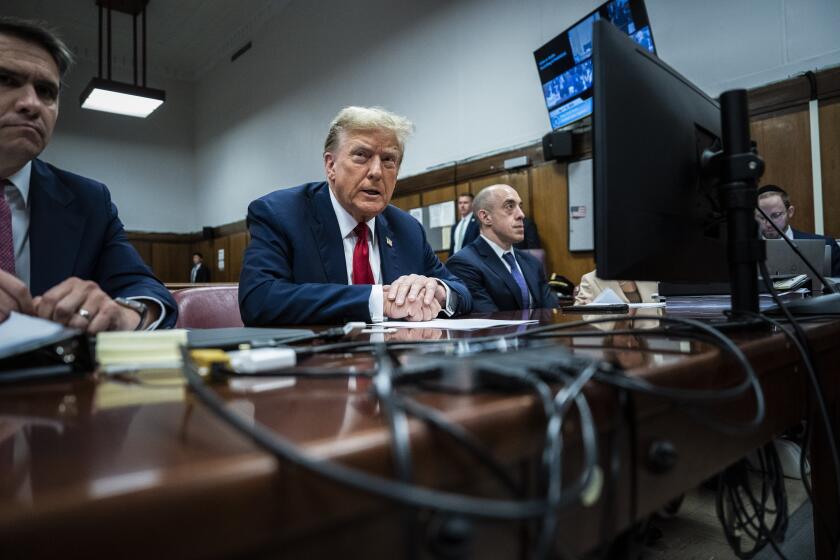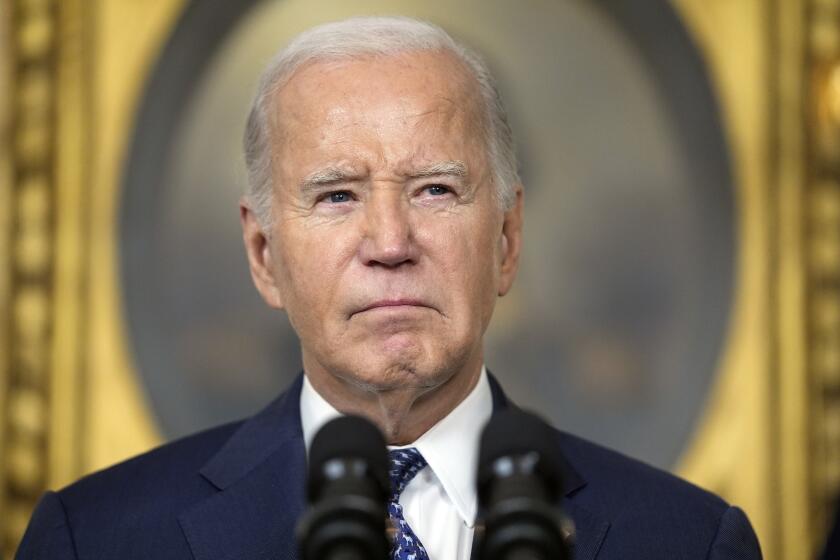Trump’s untruths pile up. Biden gets facts wrong too. Do voters care?

- Share via
Former President Trump was on another one of his screeds about how Democratic prosecutors were persecuting him, saying he’d been “investigated by the Democrats more than Billy the Kid, Jesse James and Al Capone combined.”
The crowd at a 2022 rally in North Carolina seemed to eat it up, having a hearty laugh when Trump concluded: “I think I’m perhaps the most honest human being that God ever created.” The crowd broke into applause.
As Trump campaigns to retake the White House, polls suggest Republicans have become increasingly willing to accept his pronouncements, even as a cottage industry of fact-checkers suggests reality lies elsewhere.
That’s because his grievances and complaints about an America under siege feel true in the guts of a “vast segment of the population,” who therefore view Trump as a truth-teller, said Steve Schmidt, a longtime GOP political consultant.
“So Trump is two things at once,” said Schmidt, whose blog on national politics portrays the 45th president as a demagogue and a threat to democracy. “He is simultaneously the most prolific liar in the history of American politics, and he is the most honest president we have ever had.”
Donald Trump ‘is simultaneously the most prolific liar in the history of American politics, and he is the most honest president we have ever had.’
— Steve Schmidt, Republican political consultant
Several major media outlets had created fact-checking teams before Trump rose to prominence. In 2016, the New York Times made what then was depicted as a momentous step when it called then-candidate Trump’s claim that President Obama was not born in America “a lie.”
But once the former reality show host won the presidency, fact-check outfits went into overdrive.
The Washington Post counted 30,573 “false or misleading claims” by Trump during his presidency. Many were repeat offenses, such as the more than 800 claims of election fraud, an allegation roundly rejected in the courts. After its 1,000th fact-checking of Trump this year, PolitiFact reported he was entirely or mostly wrong more than three-quarters of the time.
“It’s not unusual for politicians of both parties to mislead, exaggerate or make stuff up,” reported PolitiFact, which did not let President Biden off the hook — finding 41% of nearly 300 of his statements entirely or mostly wrong. “But American fact-checkers have never encountered a politician who shares Trump’s disregard for factual accuracy.”
Trump’s core supporters show no sign of being put off.
A case in point came this month, when Trump used a campaign event in Grand Rapids, Mich., to renew his long-running crusade against undocumented migrants.
In politicizing the death of Ruby Garcia, the Republican former president is stoking fear for votes — and ignoring the many women killed in a crisis of violent men.
Trump told the story of Ruby Garcia, whose alleged killer was in the country illegally. Trump called her a “beautiful ... incredible young woman.” He said he “spoke to some of her family” about her tragic death.
But Garcia’s sister soon told Ken Kolker of the local NBC News affiliate that Trump hadn’t spoken to anyone in the family. And Mavi Garcia said she didn’t appreciate the former president turning her 25-year-old sister’s death into a political talking point.
“He did not speak with any of us,” she told Target 8.
The Trump campaign did not respond to requests from The Times and other news outlets to discuss the discrepancy.
An everyday American calling out a former — and perhaps future — president on the news once might have been a showstopper in American politics. But no signs emerged of Trump’s supporters objecting to the error, and the Garcia incident quickly became part of the ambient noise of a campaign that promises to get louder and uglier.
A recent Washington Post survey indicated that Republicans are now less likely than they were in the midst of Trump’s presidency to acknowledge his untruths.
Asked whether Trump regularly makes misleading statements, the share of Republicans who said he does dipped by 10 percentage points, to 38%, since a 2018 survey. And the percentage of Republicans who said Trump usually makes flat-out false claims dipped down to 8% from 14%.
Trump faces the first of four criminal trials that will cut into his campaigning. He is accused of falsifying records to hide payments to a porn actor.
The coverage of Trump’s Ruby Garcia claims also pointed out other dubious comments by him that day.
PolitiFact, run by a Florida-based journalism education outfit, the Poynter Institute, focused on Trump’s inflammatory, and untrue, claim that Venezuela was emptying its prisons and sending criminals to the United States. Its staff also noted that, “overall, violent crime and homicides have declined under Joe Biden’s presidency.”
FactCheck.org, run by the Annenberg Public Policy Center at the University of Pennsylvania, focused on how Trump’s statements about immigration were misleading, noting that “apprehensions at the southwest border were 14.7% higher in Trump’s final year in office compared with the last full year before he was sworn in.” Apprehensions hit a record high at the end of 2023, during Biden’s tenure.
On Fox News, anchor Bret Baier asked about Trump’s claim being denied by Garcia’s sister. But commentator Charles Hurt never addressed the apparent falsehood, justifying Trump’s remarks as being about “something that matters deeply to people.” Hurt shifted the subject to another family whose daughter was killed in an accidental shooting committed by a man who had migrated illegally from Mexico.
Contrast the sharply divergent news coverage given to Trump and Ruby Garcia to reports of an earlier Biden misstatement — about where he was the day after 9/11.
In September of last year, it was the Democratic president being called out for a falsehood, after he said — on the 22nd anniversary of the terrorist attacks on America — that he had visited ground zero the day after the World Trade Center towers were destroyed in 2001. In fact, he had joined a congressional delegation there nine days later.
In dealing with the economy, President Biden faces all-too-real consequences of higher inflation, and he’s also battling human psychology.
Many outlets, including MSNBC, NBC, CNN and PolitiFact, mentioned Biden’s misstatement. A Wall Street Journal story asked, “Was that a gaffe born out of fatigue, an honest mistake or an exaggeration from a president with a penchant for dropping himself in the middle of the action?”
The Washington Post, the New York Times and the Los Angeles Times did not report the episode, though the Post cited a critic who attacked Biden for marking the anniversary in Alaska.
Fox devoted a good portion of its prime time to roasting Biden for “lying” about being at ground zero on Sept. 12, with Sean Hannity inviting several guests to trash the president for commemorating 9/11 at a locale other than one of the sites attacked — New York City, the Pentagon and Shanksville, Pa. Though Biden spoke from a U.S. airbase that responded to the attacks, the Fox commentators called his behavior shameful.
Generally, Biden has been less prone to the sort of unscripted moments that fact-checkers feast on, said PolitiFact Editor in Chief Katie Sanders, explaining, in part, why so many of Trump’s statements have been scrutinized.
“When a politician is speaking off-the-cuff, without carefully prepared remarks in front of them, they tend to be less accurate,” Sanders said.
Kathleen Hall Jamieson, a scholar on political communication and co-founder of FactCheck.org, said the reactions to misstatements tend to fit into well-worn narratives. Biden’s critics belittle the 81-year-old’s memory and mental capabilities. Trump’s critics note his history of lying.
Biden’s memory sometimes fails. Trump’s does, too. Voters face a choice between two elderly men with flaws. But the problems they pose aren’t equal.
Trump himself boasted in his 1987 memoir that he had mastered the art of “hyperbole.”
“People want to believe that something is the biggest and the greatest and the most spectacular. I call it truthful hyperbole,” Trump wrote. “It’s an innocent form of exaggeration — and a very effective form of promotion.”
Whether any of the campaign’s untruths make a lasting impression on voters depends on many factors, including whether they become the subject of ads, a memorable debate moment or a campaign trail meme, Jamieson said.
“Joe the Plumber” became a recurring character in the 2008 presidential campaign after Samuel Joseph Wurzelbacher pressed then-Illinois Sen. Barack Obama in Ohio about whether his tax plan would hurt small businesses.
Arizona Sen. John McCain, Obama’s GOP opponent, brought Wurzelbacher to future campaign events and made sure his view was featured in the candidates’ final debate.
Jamieson said “confirmation bias” always has been a hallmark of political true believers but has only intensified in the Trump era, on both sides.
“It’s a way of understanding virtually everything,” she said, explaining how people sometimes process unfavorable messages. “They are already inside their tribe, so if there is a dissonant message, the way to reduce the dissonance is to say it doesn’t matter, or it doesn’t change that candidate’s fidelity on a core issue.”
Times researcher Scott Wilson contributed to this report.
More to Read
Get the L.A. Times Politics newsletter
Deeply reported insights into legislation, politics and policy from Sacramento, Washington and beyond. In your inbox three times per week.
You may occasionally receive promotional content from the Los Angeles Times.















